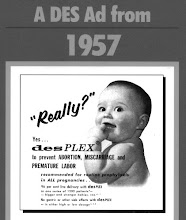 Up to 185,000 Australian women have increased risk of cancer, infertility, stillbirth and early menopause
Up to 185,000 Australian women have increased risk of cancer, infertility, stillbirth and early menopauseSydney, 6 October 2011: A new study released today in the New England Journal of Medicine* has revealed women exposed to anti-miscarriage drug DES in utero are at an increased risk of at least 12 adverse health conditions - in some cases up to three-times that of other women.
An estimated 185,000 women across Australia have been exposed in utero to this drug.
The study of medical records found women exposed to DES in utero are at double the risk of suffering infertility, at three times the risk of preterm delivery and almost twice as likely to develop breast cancer at 40 years of age or older.
DES Action NSW says this study proves what has been implied by anecdotal evidence. Australian women who have suffered one or a combination of these health conditions should speak to their doctors if they suspect their mother took DES or Stilboestrol while pregnant.
"DES exposed women require special medical care, including DES examinations and mammograms annually. This study must act as a wake up call for health authorities to promote information about DES directly to Australians in public health programs. Too often we hear from people, who for decades have been oblivious to the harmful effects of DES, the fact of their exposure and the care they need," says Carol Devine, coordinator of the DES Action group.
The study combined data from three studies in the 1970s with continued long-term follow-up of more than 4,600 women exposed in utero to DES, compared to unexposed women.
The study reports that the drug, developed in 1938, was found to be of no health benefit in four clinical trials conducted in the 1950s. Despite this, it was marketed and prescribed in many countries around the word, including Australia, until up to 1971 and sometimes beyond.
"Many women may not know they were exposed to DES, as their mothers may not recall taking the drug and medical records can go amiss over time. But if women do have a history of these health conditions, they should ask their doctors for an assessment of DES exposure probability and possible referral to a DES knowledgeable specialist," says Devine.
Women should contact DES Action NSW for more information about DES by phoning 02 98754820 or visiting www.desnsw.blogspot.com
LIFETIME RISKS OF A DES DAUGHTER
- 2.28 times the risk of cervical intraepithelial neoplasia, grade 2 or above
- 2.45 times the risk of stillbirth
- 2.35 times the risk of early menopause
- 1.64 times the risk of spontaneous abortion
- 3.72 times the risk of ectopic pregnancy
-END-
*New England Journal of Medicine 365: 14 October 6 2011 nejm.org
For more information, contact:
Carol Devine, DES Action Australia-NSW
E: c_devine@bigpond.net.au
P: (02) 98754820

No comments:
Post a Comment